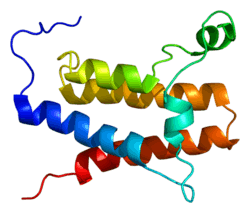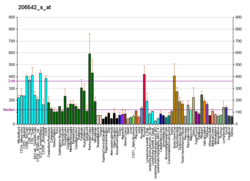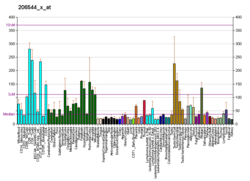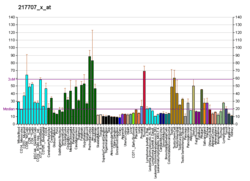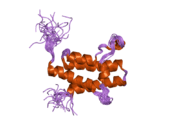SMARCA2
Probable global transcription activator SNF2L2 is a protein that in humans is encoded by the SMARCA2 gene.[5][6]
Function
The protein encoded by this gene is a member of the SWI/SNF family of proteins and is highly similar to the brahma protein of Drosophila. Members of this family have helicase and ATPase activities and are thought to regulate transcription of certain genes by altering the chromatin structure around those genes. The encoded protein is part of the large ATP-dependent chromatin remodeling complex SNF/SWI, which is required for transcriptional activation of genes normally repressed by chromatin. Two transcript variants encoding different isoforms have been found for this gene, which contains a trinucleotide repeat (CAG) length polymorphism.[6]
Interactions
SMARCA2 has been shown to interact with:
- Nicolaides Baraitser Syndrome (NCBRS)
References
- GRCh38: Ensembl release 89: ENSG00000080503 - Ensembl, May 2017
- GRCm38: Ensembl release 89: ENSMUSG00000024921 - Ensembl, May 2017
- "Human PubMed Reference:". National Center for Biotechnology Information, U.S. National Library of Medicine.
- "Mouse PubMed Reference:". National Center for Biotechnology Information, U.S. National Library of Medicine.
- Muchardt C, Yaniv M, Mattei MG (Apr 1994). "Assignment of HBRM, the human homolog of S. cerevisiae SNF2/SWI2 and Drosophila brm genes, to chromosome region 9p23-p24, by in situ hybridization". Mammalian Genome. 5 (4): 241–3. doi:10.1007/BF00360554. PMID 8012116.
- "Entrez Gene: SMARCA2 SWI/SNF related, matrix associated, actin dependent regulator of chromatin, subfamily a, member 2".
- Wang W, Côté J, Xue Y, Zhou S, Khavari PA, Biggar SR, Muchardt C, Kalpana GV, Goff SP, Yaniv M, Workman JL, Crabtree GR (Oct 1996). "Purification and biochemical heterogeneity of the mammalian SWI-SNF complex". The EMBO Journal. 15 (19): 5370–82. doi:10.1002/j.1460-2075.1996.tb00921.x. PMC 452280. PMID 8895581.
- Park J, Wood MA, Cole MD (Mar 2002). "BAF53 forms distinct nuclear complexes and functions as a critical c-Myc-interacting nuclear cofactor for oncogenic transformation". Molecular and Cellular Biology. 22 (5): 1307–16. doi:10.1128/mcb.22.5.1307-1316.2002. PMC 134713. PMID 11839798.
- Kuroda Y, Oma Y, Nishimori K, Ohta T, Harata M (Nov 2002). "Brain-specific expression of the nuclear actin-related protein ArpNalpha and its involvement in mammalian SWI/SNF chromatin remodeling complex". Biochemical and Biophysical Research Communications. 299 (2): 328–34. doi:10.1016/s0006-291x(02)02637-2. PMID 12437990.
- Inoue H, Furukawa T, Giannakopoulos S, Zhou S, King DS, Tanese N (Nov 2002). "Largest subunits of the human SWI/SNF chromatin-remodeling complex promote transcriptional activation by steroid hormone receptors". The Journal of Biological Chemistry. 277 (44): 41674–85. doi:10.1074/jbc.M205961200. PMID 12200431.
- Kowenz-Leutz E, Leutz A (Nov 1999). "A C/EBP beta isoform recruits the SWI/SNF complex to activate myeloid genes". Molecular Cell. 4 (5): 735–43. doi:10.1016/s1097-2765(00)80384-6. PMID 10619021.
- Sif S, Saurin AJ, Imbalzano AN, Kingston RE (Mar 2001). "Purification and characterization of mSin3A-containing Brg1 and hBrm chromatin remodeling complexes". Genes & Development. 15 (5): 603–18. doi:10.1101/gad.872801. PMC 312641. PMID 11238380.
- Cho H, Orphanides G, Sun X, Yang XJ, Ogryzko V, Lees E, Nakatani Y, Reinberg D (Sep 1998). "A human RNA polymerase II complex containing factors that modify chromatin structure". Molecular and Cellular Biology. 18 (9): 5355–63. doi:10.1128/MCB.18.9.5355. PMC 109120. PMID 9710619.
- Wang S, Zhang B, Faller DV (Jun 2002). "Prohibitin requires Brg-1 and Brm for the repression of E2F and cell growth". The EMBO Journal. 21 (12): 3019–28. doi:10.1093/emboj/cdf302. PMC 126057. PMID 12065415.
- Perani M, Ingram CJ, Cooper CS, Garrett MD, Goodwin GH (Nov 2003). "Conserved SNH domain of the proto-oncoprotein SYT interacts with components of the human chromatin remodelling complexes, while the QPGY repeat domain forms homo-oligomers". Oncogene. 22 (50): 8156–67. doi:10.1038/sj.onc.1207031. PMID 14603256.
Further reading
- Aves SJ, Hindley J, Phear GA, Tongue N (Aug 1995). "A fission yeast gene mapping close to suc1 encodes a protein containing two bromodomains". Molecular & General Genetics. 248 (4): 491–8. doi:10.1007/BF02191650. PMID 7565614.
- Chiba H, Muramatsu M, Nomoto A, Kato H (May 1994). "Two human homologues of Saccharomyces cerevisiae SWI2/SNF2 and Drosophila brahma are transcriptional coactivators cooperating with the estrogen receptor and the retinoic acid receptor". Nucleic Acids Research. 22 (10): 1815–20. doi:10.1093/nar/22.10.1815. PMC 308079. PMID 8208605.
- Muchardt C, Yaniv M (Nov 1993). "A human homologue of Saccharomyces cerevisiae SNF2/SWI2 and Drosophila brm genes potentiates transcriptional activation by the glucocorticoid receptor". The EMBO Journal. 12 (11): 4279–90. doi:10.1002/j.1460-2075.1993.tb06112.x. PMC 413724. PMID 8223438.
- Muchardt C, Reyes JC, Bourachot B, Leguoy E, Yaniv M (Jul 1996). "The hbrm and BRG-1 proteins, components of the human SNF/SWI complex, are phosphorylated and excluded from the condensed chromosomes during mitosis". The EMBO Journal. 15 (13): 3394–402. doi:10.1002/j.1460-2075.1996.tb00705.x. PMC 451903. PMID 8670841.
- Wang W, Xue Y, Zhou S, Kuo A, Cairns BR, Crabtree GR (Sep 1996). "Diversity and specialization of mammalian SWI/SNF complexes". Genes & Development. 10 (17): 2117–30. doi:10.1101/gad.10.17.2117. PMID 8804307.
- Wang W, Côté J, Xue Y, Zhou S, Khavari PA, Biggar SR, Muchardt C, Kalpana GV, Goff SP, Yaniv M, Workman JL, Crabtree GR (Oct 1996). "Purification and biochemical heterogeneity of the mammalian SWI-SNF complex". The EMBO Journal. 15 (19): 5370–82. doi:10.1002/j.1460-2075.1996.tb00921.x. PMC 452280. PMID 8895581.
- Ichinose H, Garnier JM, Chambon P, Losson R (Mar 1997). "Ligand-dependent interaction between the estrogen receptor and the human homologues of SWI2/SNF2". Gene. 188 (1): 95–100. doi:10.1016/S0378-1119(96)00785-8. PMID 9099865.
- Cho H, Orphanides G, Sun X, Yang XJ, Ogryzko V, Lees E, Nakatani Y, Reinberg D (Sep 1998). "A human RNA polymerase II complex containing factors that modify chromatin structure". Molecular and Cellular Biology. 18 (9): 5355–63. doi:10.1128/MCB.18.9.5355. PMC 109120. PMID 9710619.
- Thaete C, Brett D, Monaghan P, Whitehouse S, Rennie G, Rayner E, Cooper CS, Goodwin G (Apr 1999). "Functional domains of the SYT and SYT-SSX synovial sarcoma translocation proteins and co-localization with the SNF protein BRM in the nucleus". Human Molecular Genetics. 8 (4): 585–91. doi:10.1093/hmg/8.4.585. PMID 10072425.
- Phelan ML, Sif S, Narlikar GJ, Kingston RE (Feb 1999). "Reconstitution of a core chromatin remodeling complex from SWI/SNF subunits". Molecular Cell. 3 (2): 247–53. doi:10.1016/S1097-2765(00)80315-9. PMID 10078207.
- Lee DW, Zhang K, Ning ZQ, Raabe EH, Tintner S, Wieland R, Wilkins BJ, Kim JM, Blough RI, Arceci RJ (Jul 2000). "Proliferation-associated SNF2-like gene (PASG): a SNF2 family member altered in leukemia". Cancer Research. 60 (13): 3612–22. PMID 10910076.
- Phelan ML, Schnitzler GR, Kingston RE (Sep 2000). "Octamer transfer and creation of stably remodeled nucleosomes by human SWI-SNF and its isolated ATPases". Molecular and Cellular Biology. 20 (17): 6380–9. doi:10.1128/MCB.20.17.6380-6389.2000. PMC 86113. PMID 10938115.
- Xue Y, Canman JC, Lee CS, Nie Z, Yang D, Moreno GT, Young MK, Salmon ED, Wang W (Nov 2000). "The human SWI/SNF-B chromatin-remodeling complex is related to yeast rsc and localizes at kinetochores of mitotic chromosomes". Proceedings of the National Academy of Sciences of the United States of America. 97 (24): 13015–20. doi:10.1073/pnas.240208597. PMC 27170. PMID 11078522.
- Machida Y, Murai K, Miyake K, Iijima S (Jan 2001). "Expression of chromatin remodeling factors during neural differentiation". Journal of Biochemistry. 129 (1): 43–9. doi:10.1093/oxfordjournals.jbchem.a002834. PMID 11134956.
- de la Serna IL, Carlson KA, Imbalzano AN (Feb 2001). "Mammalian SWI/SNF complexes promote MyoD-mediated muscle differentiation". Nature Genetics. 27 (2): 187–90. doi:10.1038/84826. PMID 11175787.
- Ruhf ML, Braun A, Papoulas O, Tamkun JW, Randsholt N, Meister M (Apr 2001). "The domino gene of Drosophila encodes novel members of the SWI2/SNF2 family of DNA-dependent ATPases, which contribute to the silencing of homeotic genes". Development. 128 (8): 1429–41. PMID 11262242.
- Strobeck MW, Reisman DN, Gunawardena RW, Betz BL, Angus SP, Knudsen KE, Kowalik TF, Weissman BE, Knudsen ES (Feb 2002). "Compensation of BRG-1 function by Brm: insight into the role of the core SWI-SNF subunits in retinoblastoma tumor suppressor signaling". The Journal of Biological Chemistry. 277 (7): 4782–9. doi:10.1074/jbc.M109532200. PMID 11719516.
- Kato H, Tjernberg A, Zhang W, Krutchinsky AN, An W, Takeuchi T, Ohtsuki Y, Sugano S, de Bruijn DR, Chait BT, Roeder RG (Feb 2002). "SYT associates with human SNF/SWI complexes and the C-terminal region of its fusion partner SSX1 targets histones". The Journal of Biological Chemistry. 277 (7): 5498–505. doi:10.1074/jbc.M108702200. PMID 11734557.
- Mizutani T, Ito T, Nishina M, Yamamichi N, Watanabe A, Iba H (May 2002). "Maintenance of integrated proviral gene expression requires Brm, a catalytic subunit of SWI/SNF complex". The Journal of Biological Chemistry. 277 (18): 15859–64. doi:10.1074/jbc.M112421200. PMID 11850427.
